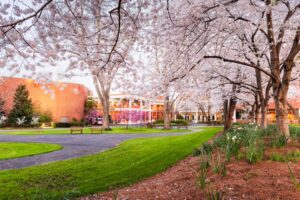Many think pieces have forecast the end of liberal arts as an educational system, or predicted that liberal arts colleges specifically may fall into decline. While these may be exaggerated for attention grabbing headlines, there are some signs that liberal arts colleges are not doing well recently.
In this article, we’ll explore what problems liberal arts colleges are facing and what these issues might mean for their future. We’ll also explore some of the top liberal arts colleges in the country, the so-called “Little Ivies,” and see how they’re handling this apparent crisis. Let’s get started!
Important Note:
Liberal arts does not mean humanities. A liberal arts education is a comprehensive overview of arts, humanities, social sciences, and natural sciences. It does not include more career oriented fields like business, and often does not include engineering.
What’s Happening to the Liberal Arts?
There has been a declining interest in the liberal arts generally, as more young people seek educational experiences which more directly prepare them for employment. This runs counter to the stated mission of liberal arts schools, which focus much more on preparing students with a broad base of knowledge and problem solving skills instead of directly preparing them to enter a particular industry.
This can be seen in the increasing popularity of STEM and business majors, and the continual appeal of law school and medical school. As economic uncertainty continues to rear its head, many more students seek the financial security they see coming from majors which more directly tie them to a career.
There is another reason liberal arts colleges specifically are seen as threatened, however. This is because many larger institutions are now describing themselves as providing the liberal arts experience for students who want it, and seeking to replicate an environment they had not offered before.
This is because, even as some students definitely prefer a non-liberal arts approach, a number still find it valuable. Larger universities are more easily able to offer both options, while smaller liberal arts colleges are less able to shift their approach. Thus small liberal arts colleges are feeling strained from two angles: first, there is a decreasing pool of students who value a traditional liberal arts education, and who desire to seek it out. Second, there is an increased amount of competition for the pool of students who are seeking a liberal arts education, as more research universities expand their liberal arts offerings.
The Little Ivies
To examine how this is impacting schools, we’ll take a look at the so called “Little Ivies.” These schools are an unofficial group, and there are no strict requirements for inclusion; instead member schools are considered this for being small Northeastern liberal arts colleges, with large endowments and prestigious histories.
We don’t have room to discuss all of these schools, so we’ll cover a sampling. The schools we’ll be discussing are:
- Amherst College
- Bowdoin College
- Middlebury College
- Swarthmore College
- Williams College
Amherst College
Located in Amherst, Massachusetts, Amherst is the third oldest college in the state, and is known to be highly selective. The student body is fewer than 2,000, and they enroll 450-500 students in each incoming freshman class.
Over the past few years, the acceptance rate of the school has declined, and the overall number of applicants has risen. They do not have the flood of applicants seen by schools like UCLA or NYU; in 2021 13,999 students applied to the school, and 8.7% were accepted. This acceptance rate is on par with Ivy League universities.
Academically, Amherst offers 45 majors, across the humanities, sciences, and social sciences. They do not have programs in engineering or business, and do not have any graduate schools or graduate students. Indeed, none of these schools offer business or engineering programs, and none of them serve graduate students.
Bowdoin College
Located in Brunswick, Maine, Bowdoin has a rural setting, and is the oldest college in the state of Maine. The college is ranked highly regularly, and is incredibly selective in its enrollments. The school has fewer than 2,000 students, and enrolls around 500 students in each incoming class.
The overall acceptance rate for Bowdoin has been declining, with an acceptance rate of 9% this past year. While overall admissions rates have fluctuated, the acceptance rate has been steadily declining for the past decade. The number of applicants has also fluctuated, but has shown steady signs of increasing.
Academically, Bowdoin offers 34 majors across the sciences and humanities. While the school does not have its own engineering program, it does partner with other universities, including Columbia, Caltech, and Dartmouth, with structured 5-year programs to allow its students to study engineering at another institution. While Bowdoin originally had an attached medical school, it no longer serves graduate level students.
Middlebury College
Located in Middlebury, Vermont, Middlebury College was the first college to operate in Vermont. Middlebury has long been known for its progressive teaching and principles, and was the first institute of higher education to award a degree to an African American, along with being one of the first to open the school to coeducation.
The school has 2,500 students, and enrolls approximately 600 students in each incoming class. The most recent acceptance rate for Middlebury was 13%, and has shown a steady decline over the past decade. While the number of applicants has fluctuated, it has risen overall in the past decade.
Academically, Middlebury offers 44 majors across the humanities, social sciences, and sciences. Of note is Middlebury’s course schedule, which is 4-1-4; they offer a standard fall and spring semester, and then have a curtailed term in January (often called J-term by students), where students take a single intensive course. They do not offer courses in business or engineering, though economics is one of the most popular majors at the school.
Swarthmore College
Located in Swarthmore, Pennsylvania, Swarthmore College is a member of both the Tri-College consortium, and the Quaker consortium, allowing its students to take courses at other liberal arts colleges, and from the University of Pennsylvania. While the school was founded by Quakers, it dropped its religious affiliation in 1906, and is currently non-sectarian.
The school has around 1,600 students, and enrolls approximately 400 in each incoming class. Admissions are quite competitive, with a 7.8% acceptance rate this past year. The acceptance rate has fluctuated, but has declined over the past decade. Correspondingly, the number of applicants has increased, with 13,012 applying this past admissions cycle.
Academically, Swarthmore offers 40 majors. While the school does not offer business or engineering courses itself, due to the consortiums it is in, students are able to take these courses at UPenn. You are not permitted to complete majors from an associated school, however.
Williams College
Located in Williamstown, Massachusetts, Williams College is the second oldest college in the state, after Harvard. The school has fewer than 2,000 students, and enrolls 500-550 in each incoming class.
Williams is highly selective, with an overall acceptance rate of 8% last year, out of 12,542 applicants. While there have been fluctuations, notably in 2020, the overall trend has been an increase in applications and a decrease in admissions rate over the past decade. Their acceptance rate is commensurate with the Ivy League.
Academically, Williams offers 36 majors across the humanities and sciences. While it is primarily an undergraduate institution, it offers two graduate degrees, and enrolls 25 graduate students. Of note is Williams’ course schedule, which is 4-1-4; they offer a standard fall and spring semester, and then have a curtailed term in January (often called J-term by students), where students take a single intensive course.

What Does This Tell Us?
All five of these schools are very highly ranked, and are suffering from no marked decline in applications or enrollments. This mirrors what we see in trends for university enrollment generally. While colleges as a whole have seen a drop in enrollment numbers in recent years, top universities are receiving ever more applicants, and have ever decreasing acceptance rates.
This is caused by students applying to an increasing number of schools, and wanting to ensure they receive the best value for their education. College is very expensive (and so we’ve written about financial aid before), and students want to make sure they are getting the best possible value for their money. This means they are increasingly attracted to top institutions, and less likely to attend colleges which are seen as less prestigious, or less able to provide what the students need.
Thus, liberal arts colleges as a whole should not be said to be dying, and neither should the idea of liberal arts as a whole. Instead, patterns of applications to colleges as a whole are shifting, and this is going to impact which colleges can stay open, and what offerings they may present.
Final Thoughts
A liberal arts education has long been the basis of the collegiate experience in the United States. While this may lessen over time, top universities will likely hold tight to their roots, since this is what has allowed them to grow to their current size and prestige. At the same time, admissions rates for these schools are likely going to continue to decline.
We hope this article has shown you the future of the liberal arts, and also given you insight into the world of the Little Ivies. These are great schools, though difficult to apply to. If you want advice on your applications, or to learn more about whether a liberal arts college is right for you, schedule a free consultation today. We have a depth of experience, and are always happy to help you with your collegiate dreams.








